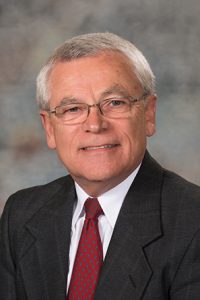Brand Act changes considered
The Agriculture Committee heard testimony Feb. 9 on a bill that would make several changes to the Nebraska Livestock Brand Act.
Hastings Sen. Steve Halloran, sponsor of LB572, said it would allow the Nebraska Brand Committee to inspect livestock using an approved nonvisual identifier such as an electronic tag, nose print, retinal scan or DNA match.
He said the bill also would reduce the annual registration fee for registered feedlots — which are allowed to ship cattle without inspection as long as they meet recordkeeping and auditing requirements — and impose an annual audit fee that would reflect more closely the audit program’s cost.
LB572 also temporarily would reduce the physical inspection fee — which currently may be no more than $1.10 per head — to 95 cents per head until June 30, 2023. Beginning July 1, 2023, it could be no more than $1.50 per head.
Additionally, Halloran said, the bill would address the increasingly common practice of registered feedlots placing their cattle in a backgrounder lot before moving them to a registered feedlot for finishing. This requires two inspections under current law, he said.
LB572 would allow a registered feedlot within the brand area to move cattle from a backgrounder lot to a registered feedlot without inspection if 100 percent of the cattle in the backgrounder lot are owned by the registered feedlot, among other requirements.
The bill also would make violations of several Brand Act provisions infractions enforceable by citation, Halloran said.
Finally, the bill would require the committee to provide a certified bill of sale and a certified transportation permit to qualified dairies that sell or move calves under 30 days of age out of the inspection area for beef production purposes.
Melody Benjamin testified in support of the bill on behalf of the Nebraska Cattlemen and the Nebraska Farm Bureau. Not all segments of the cattle industry agree with the changes proposed in LB572, she said, but it would help modernize brand inspection laws to better reflect current business practices.
Steve Wolfe testified in support of the bill on behalf of the Nebraska State Dairy Association. He said the proposed transportation permit would reduce inspection fees for dairy farmers, most of whom do not raise their calves but instead ship them out of the inspection area to another ranch.
Wolfe said the association also favors electronic inspection because it would reduce the time and expense required for inspections.
John Schroeder, general manager of a registered feedlot near Cozad, also testified in support. He said he favors reducing fees for registered feedlots but that LB572 does not go far enough.
Schroeder also supported the proposed backgrounder lot exemption, although he said it might not be feasible to meet the requirement that 100 percent of the cattle there be owned by one feedlot.
Testifying in opposition was Lee Borck, a cattle feeder with feedlots in Kansas and Nebraska. He said the bill would not make Nebraska cattle producers competitive with those in other states, such as Kansas, that have voluntary brand inspection programs.
Borck said he receives no benefit from Nebraska brand inspections, which cost him roughly $50,000 per year.
David Wright also testified in opposition to the bill, saying it would favor one segment of the cattle industry. Under LB572, he said, registered feedlots could pay as little as 25 cents per head for inspections, compared to 95 cents for all others.
“How do you expect to maintain a system to prove ownership if you’re going to start allowing these carve-outs?” Wright said.
Adam Sawyer, chairperson of the Nebraska Brand Committee, gave neutral testimony on LB572. He said the committee favors allowing brand inspectors to write citations because the decision to file charges for a brand inspection violation currently is left to county attorneys.
Sawyer said the committee also supports a provision in LB572 that would allow it to charge producers for mileage. This would help the committee recoup costs when inspectors must drive long distances to inspect only a few head of cattle, he said.
The committee took no immediate action on the bill.

